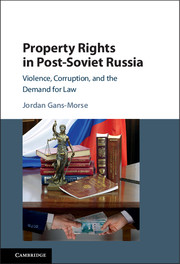Book contents
- Frontmatter
- Contents
- List of Tables
- List of Figures
- Acknowledgments
- 1 Violence, Corruption, and Demand for Law
- 2 Institutional Supply and Demand
- 3 The Evolution of FirmStrategies
- 4 The Role of State Legal Capacity
- 5 Demand-Side Barriers to the Use of Legal Strategies
- 6 The Effectiveness of Illegal Strategies
- 7 Variation in Strategies across Firms
- 8 Firms, States, and the Rule of Law in Comparative Perspective
- Appendices
- References
- Index
1 - Violence, Corruption, and Demand for Law
Published online by Cambridge University Press: 13 July 2017
- Frontmatter
- Contents
- List of Tables
- List of Figures
- Acknowledgments
- 1 Violence, Corruption, and Demand for Law
- 2 Institutional Supply and Demand
- 3 The Evolution of FirmStrategies
- 4 The Role of State Legal Capacity
- 5 Demand-Side Barriers to the Use of Legal Strategies
- 6 The Effectiveness of Illegal Strategies
- 7 Variation in Strategies across Firms
- 8 Firms, States, and the Rule of Law in Comparative Perspective
- Appendices
- References
- Index
Summary
Throughout the world, firms employ a variety of strategies to secure property rights. As recognized since Macaulay's (1963) pioneering work, many of these strategies do not rely on formal legal institutions. Firms turn to litigation or law enforcement only as a last resort, preferring instead to resolve conflicts on the basis of personal relationships and informal norms. But under certain conditions, firms eschew formal legal institutions in favor of more nefarious strategies – strategies that utilize violence or corruption.
During the California Gold Rush of 1848, for instance, Umbeck (1981, p. 100) found that “the ability to use violence was the basis for all property rights” and therefore “every miner carried at least one gun.” In a more contemporary setting, De Soto (2003, p. 155) documents howmany Peruvian firms rely on “the protection that local bullies or mafias are willing to sell them.” In Indonesia, private security companies not only fulfill the more prosaic tasks of guarding land and buildings but also offer a wide range of services, including “the intimidation of a client's business rivals” (Wilson, 2010, p. 255). Even in some of the world's most developed economies, firms rely extensively on private coercion. According to Milhaupt and West's (2000, p. 66) analysis of Japan, “the influence of organized crime is readily apparent in bankruptcy and debt collection, property development, dispute settlement, shareholders’ rights, and finance.” And in post-Soviet Russia, the primary focus of this book, violence in the 1990s reached such proportions that approximately two-fifths of surveyed enterprise managers reported personally facing coercion or threats of physical harm in the course of doing business (Radaev, 1999, pp. 36–40).
In addition to violence, firms frequently rely on corruption to secure property, offering informal payments to state officials in exchange for protection or for illicit raids against competitors. Wank (2004, p. 113) finds evidence in China of “entire [government] bureaus defining their practical policies and operating procedures to support private firms in ways of varying legality.” Meanwhile, in Uganda elected officials serving on Local Councils collect informal fees to resolve property disputes, despite government efforts to move such conflicts into formal adjudicatory institutions provided by the state (Joireman, 2011, pp. 62–66).
- Type
- Chapter
- Information
- Property Rights in Post-Soviet RussiaViolence, Corruption, and the Demand for Law, pp. 1 - 15Publisher: Cambridge University PressPrint publication year: 2017



